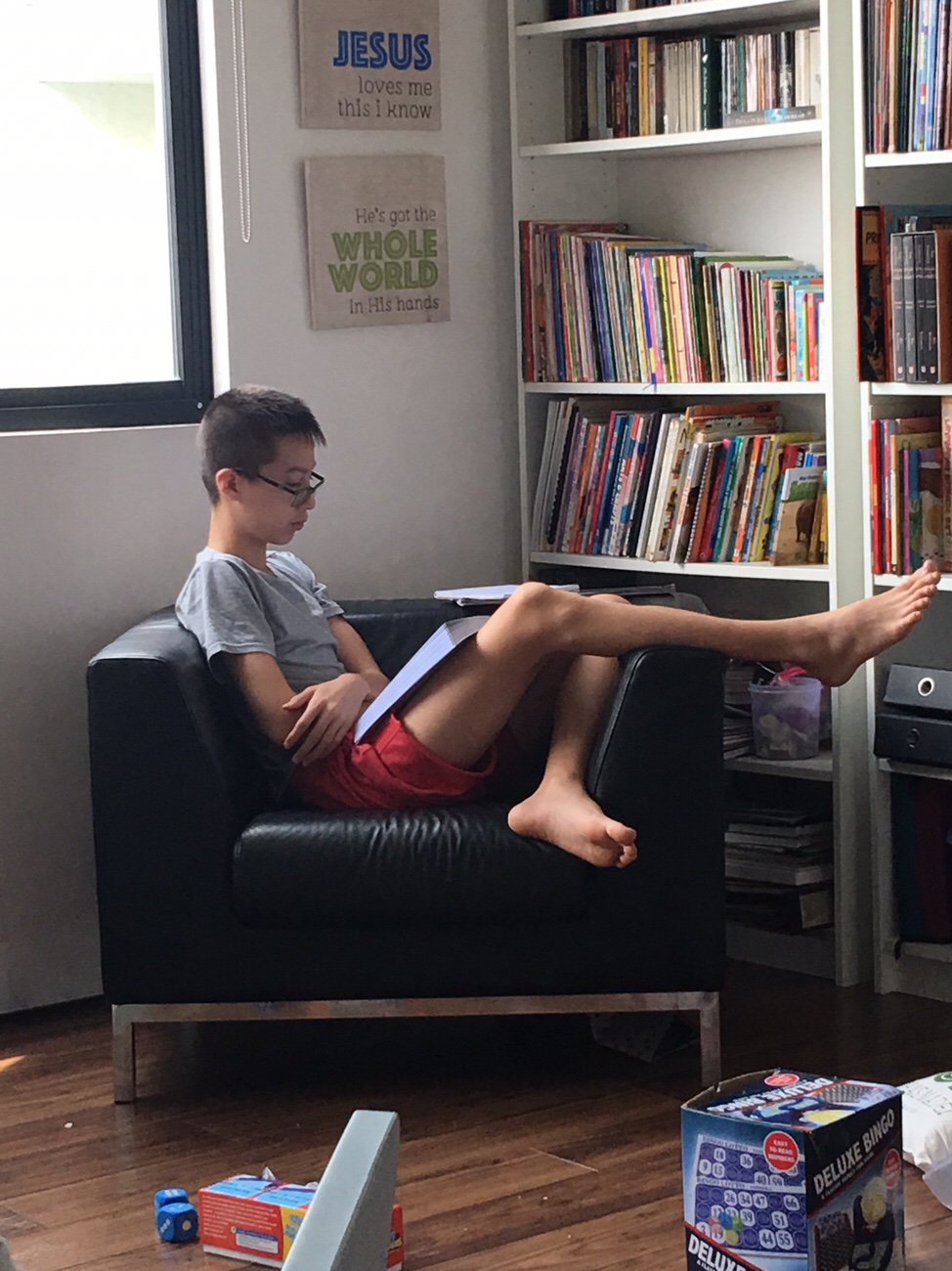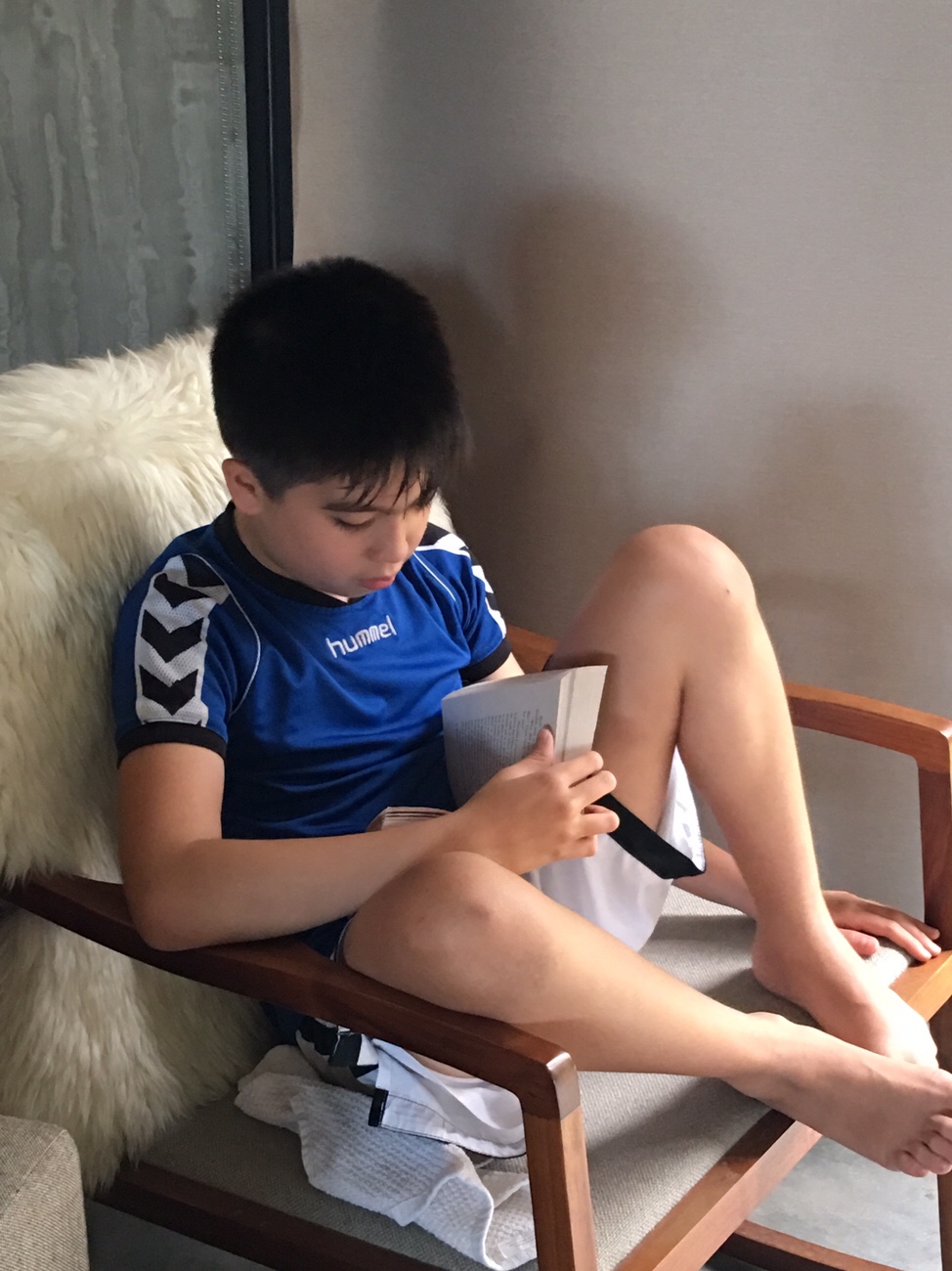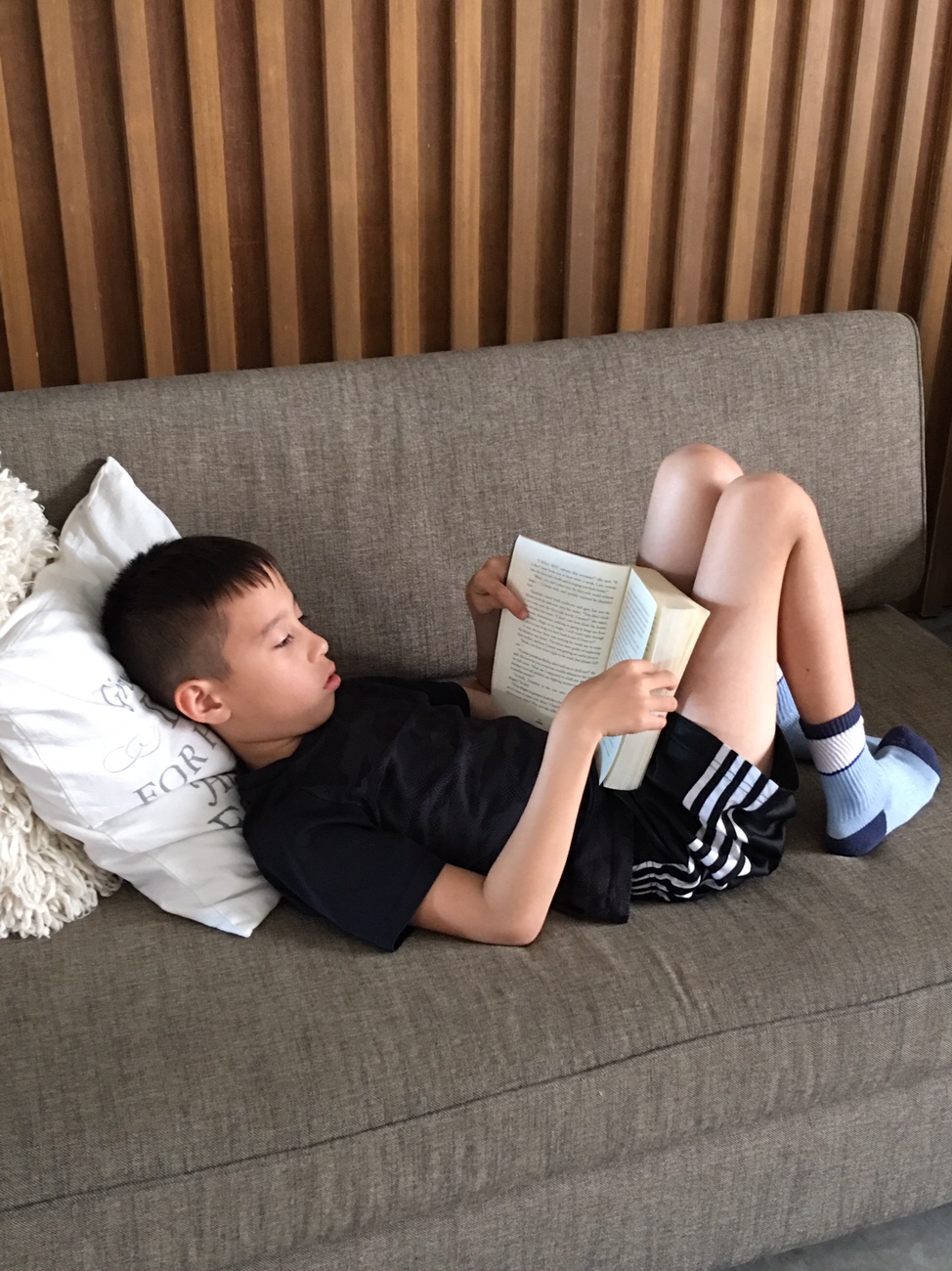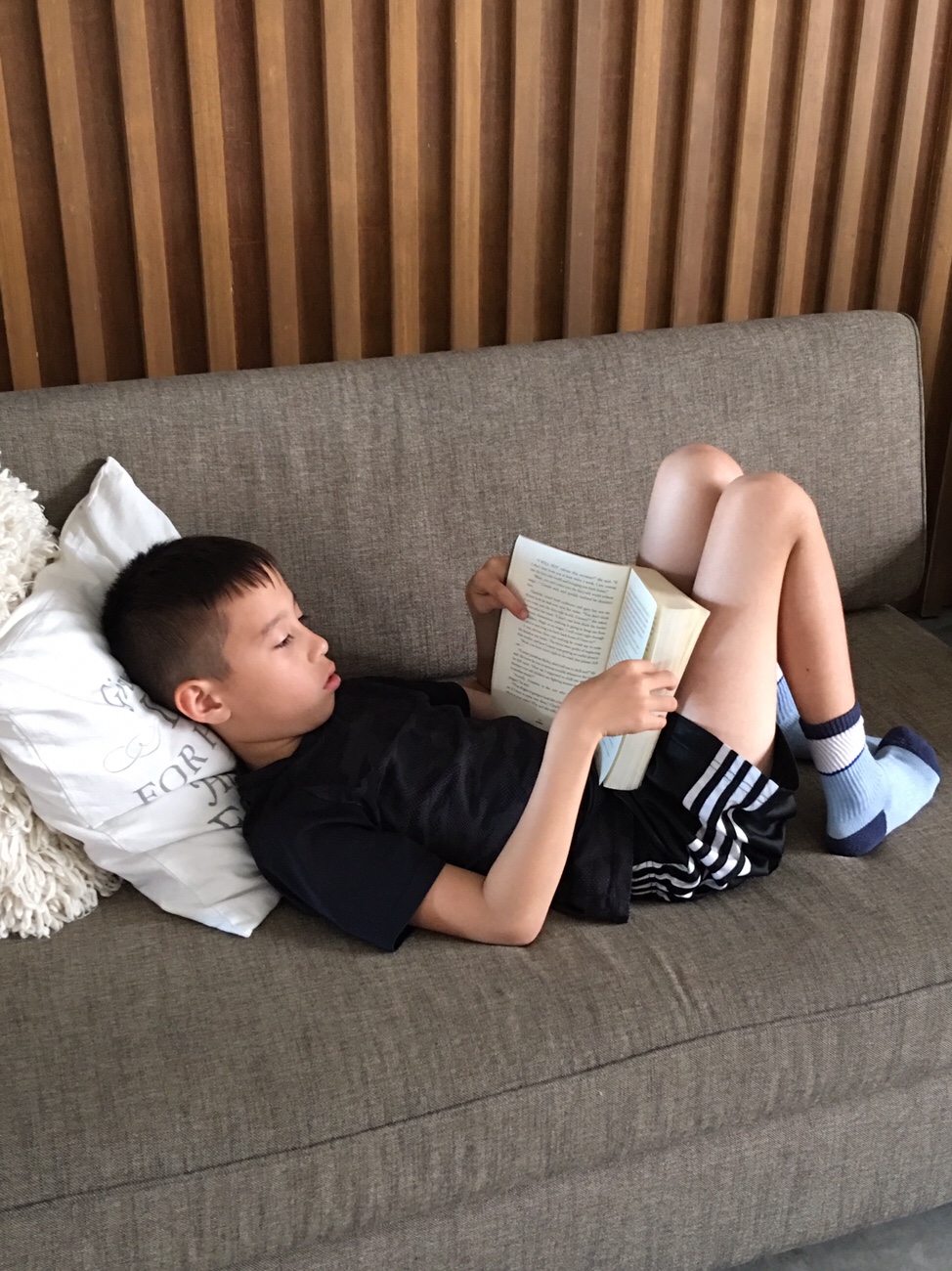I always prayed that my kids would love reading but they didn’t all follow the same “path” to becoming proficient readers. Their developmental differences and personalities had to be taken into consideration as I taught them to be readers. However, there were a few things I did pretty consistently to encourage my boys to pick up books that I hope will help you with your son(s):


- Read stories to them as infants, or as early as now if you haven’t started yet. It’s never too late. Even older children appreciate time listening to a parent read an entertaining story. My fourteen year old still enjoys being read to.
- Teach letters and their sounds (phonics) as soon as possible. Even if they don’t start reading right away, familiarization with letters and their sounds will give them a good foundation for decoding words. You can identify letters and words everywhere you go, too — on signs, billboards, boxes, lists, toys, etc. If you make it like an “I Spy” game it makes it even more fun for boys. “I spy a letter O, can you find it?”
- Use online reading programs to supplement your instruction. I wouldn’t depend on these to teach your child to read because a parent is usually more effective than an app or online program. To reinforce my instruction, however, I did use Starfall and Reading Eggs.
- Study what they are into and get books that allow them to read and learn about their interests. You can start with picture books just to get them used to handling books. As they get older, they tend to appreciate books about adventure, machines, inventions, mystery and suspense, science fiction, comedy, war, etc. Forget about getting them into the Classics at the beginning. It works for some boys but not all of them. That can wait till later on when they are more confident readers. With Edan, he actually preferred comics like Calvin and Hobbes and Adventures of Tin-Tin to books with just text in them. (He’s my visual learner.) Now, however, he can sit through reading hundreds of pages of a book he likes.
- Take them to the bookstore or second hand book store and make these trips feel like something special. “If we get our work done this week, we can go to the bookstore!”
- Reward with books. Give books as presents. Elevate reading and learning through reading as a value and not just a skill in your home. A significant number of Christmas gifts this past year for our sons were books.
- Introduce them to a good series or collections. A good series lures them in and makes them want to keep reading what happens in the next book. At present, my third son, Titus, is hooked on The Land of Stories series by Chris Colfer. When Edan was younger, he had many of the Mr. Men books. Then he went on to Box Car Children, Choose Your Own Adventure, Life of Fred books, and at present, he wants the whole set of Horrible Histories, and he’s reading The Heroes Guide Series by Christopher Healy.
- Appreciate and applaud their book reading. “Wow! You read that book?! It’s a long one!That was a hard one!” Boys like it when you are impressed with their skills. It appeals to their competitive nature.
- Don’t compare them with others, especially their siblings. Elijah read earlier than the others, but eventually Edan and Titus got into reading, too. If the reading environment is a conducive one, they will get there so there’s no need to panic or worry that they won’t ever read. I have had to learn this truth with five kids. Each one is different but with consistency and the commitment to teach them to read, they do embrace it at some point.
- Let them see you reading a lot and enjoying it. It also helps when older siblings set the example and talk about what they are reading about. That’s how Edan and Titus got curious about reading some of the books that Elijah was reading.
- Limit screen time and accessibility to devices and gadgets. Don’t, for example, buy each of your kids a phone and an IPad or laptop, and upgrade them to the latest models regularly. Let them earn these, use hand-me-downs, or let them share a family device so time on it is limited due to multiple users. If they are always entertained by television and gadgets, it will hard to pull them away from these to sit down in front of a book.
- Pray for them to love reading! I do this regularly. At the end of the day, any ability or capacity our children have are gifts from the Lord and He delights to answer our prayers for our kids. And with something like reading, the ultimate aim ought to be getting them to love to read the Word of God.
So my boys are reading well, praise God, now it’s time to work on my girls’ love for reading!



Wow, thanks for this, Joy! I seriously need for my boy to catch the love of reading, but have been unsuccessful the past year. Hope I can motivate him again this year with your tips. And I think it’s easier for girls to fall in love with reading as there are a TON of books out there for girls. It’s more like actually shielding them from the wrong ones, I think.
Thank you for sharing this helpful post, Joy. May I ask where did you get those two nice wall posters on the first picture? God bless! 🙂
Hi Joy!!! Wonderful read! 🙂 Not yet a mom, but will surely look back at these tips next time! Though I want to share a book and a study/research done by Timothy Walker, he has a book and a blog called Teach like Finland, and Taught by Finland. It’s also a pretty good read, it says that there is no long-term benefit to kindergarteners being taught to read so early, and that focusing on play-based learning is key to really hone their imagination, thus their literacy skills in the future. Currently, I am working in a play-based progressive school that believes in that too. At first I was againsts the fact that they don’t correct or even simply let these kids know when they’re spelling incorrectly (including simple CVC words, at first it was really hard for me!) But I realized, the kids in my class, majority of them love making their own books on their own, without us even pushing and forcing them to do so. They draw and put scribbles below every page pretending for them to be sentences, and their stories are so creative and out of this world. They enjoy reading these books in front of class and they look forward to this routine.I notice that conferring, and just allowing them to feel like little authors (without interupting them with the conventional way of writing letters) allow them to feel really independent, and free, they don’t feel bounded and the pressured in writing these “real letters”. As they read, they point to these scribles pretending for it to be letters, words, and sentences depending on how short these scribles are. The school I work with now believes that there is no right or wrong way of phonics, just conventional ones that they learn when they enter an higher level. I see lots of good outcomes from that too, because, slowly I see kids learning real letters (alphabet) on their own, without us or their parents (according to them) teaching them phonics as early. “Is that letter A?” “Is that big? Mom read me another book that also has the word big!” The kids also ask us to always read them books even during free play. Most of the time though, we see them glancing through books and interpretting the pictures, and able to share it with others. We read them books all the time, sometimes repetitively to the point that they memorize the story and read the whole book by themselves.
However, I also taught in Life (had the best time ever!) which had an eclectic curriculum. We had worksheets in preschool on phonics, but also time for other things like math, chapel, PE, chinese, play, etc. I saw the kids learning too, and I saw that a lot of them became inclined to reading books as well. Although we didnt get unlimited time to just make books, role-play, and be all creative and imaginative, I saw that the kids I taught also had it in them. Meeting them frequently for reunions allowed me to verify these findings as most of my past students are now able to read and write at age 5. They, and their parents are so happy and proud of it. At the same time, I also saw they were developing holistically and excelling in other subject areas. Which I agree, can also be a good advantage for setting a strong academic foundation. Had a really good bond with the parents in my previous school, we were indeed partners. I know in their homes, they supported these kids’ imagination and didn’t pressure them to memorize the alphabet. On my last school year, I was so glad that I got to introduce phonics to my class, but at the same time recieved zero pressure and comiplains from parents as to why their kids can’t read perfectly yet.
Not disagreeing, just a thought! 🙂 I guess in the end, it’s all about balance and good modeling! Everyone has their own style and it can all be effective when properly and consistenly supported and implemented.
Love your writing! Always a blessing!
Hana